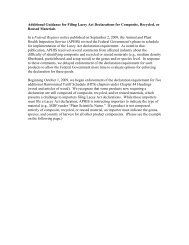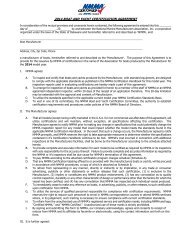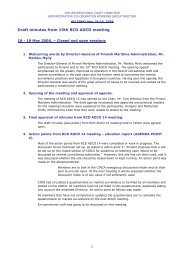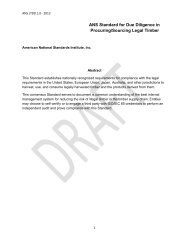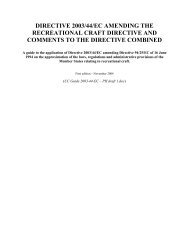Intellectual Property Protection and Enforcement Manual - Ipr-policy.eu
Intellectual Property Protection and Enforcement Manual - Ipr-policy.eu
Intellectual Property Protection and Enforcement Manual - Ipr-policy.eu
Create successful ePaper yourself
Turn your PDF publications into a flip-book with our unique Google optimized e-Paper software.
Br<strong>and</strong> <strong>Protection</strong> <strong>Manual</strong><br />
NBC Universal<br />
In the early 20th century, the emergence of both television <strong>and</strong> motion pictures created a<br />
highly influential new form of entertainment for audiences in America <strong>and</strong> around the<br />
world. In recent decades, technological advances in this industry have revolutionized the<br />
way consumers enjoy this form of entertainment. From the VCR of the 1970s to the DVD<br />
of the 1990s to the latest Blu-Ray HD-DVD, new video technology has made it easier for<br />
millions to enjoy movies, TV shows, <strong>and</strong> other content from the comfort of their own homes.<br />
Similarly, new developments in digital content technology, combined with globalization <strong>and</strong><br />
the Internet, have made computers portals for entertainment just a mouse click away <strong>and</strong> have<br />
broadened the reach of America’s culture. Today, entertainment-based intellectual property<br />
is quite literally America’s most valuable export sector. Movies, music, <strong>and</strong> books are at the<br />
heart of American culture. American actors, artists, <strong>and</strong> writers serve as our nation’s cultural<br />
ambassadors as their work is seen, heard, <strong>and</strong> read worldwide every day.<br />
While millions across the world enjoy legitimate Internet offerings of entertainment content,<br />
the rise of technology has also brought about one of the greatest challenges facing content<br />
companies like NBC Universal—namely, digital theft, sometimes referred to as piracy.<br />
According to a 2006 study done for the Institute for Policy Innovation, each year the U.S.<br />
economy loses more than $20 billion in output from movie piracy alone, which translates into<br />
more than 140,000 lost jobs for U.S. workers <strong>and</strong> more than $837 million in lost taxes to<br />
federal, state, <strong>and</strong> local governments.<br />
NBC Universal’s (NBCU) General Counsel Rick Cotton emphasized the scale of the<br />
corrosive effects: “Digital theft is one of the greatest challenges facing the motion picture <strong>and</strong><br />
television industry today. When a copyrighted work loses revenues to piracy, that money is<br />
not available to reinvest into more production work. This loss not only affects the company<br />
<strong>and</strong> its workers who would have contributed to or benefited from these unmade productions.<br />
It also reduces the revenue of the upstream suppliers to movie producers. This includes set<br />
construction <strong>and</strong> location rentals, the truckers that move the equipment, <strong>and</strong> restaurants,<br />
caterers, <strong>and</strong> hotels that provide housing <strong>and</strong> meals to the hundreds of crew members<br />
working on location. Downstream industries, like movie theaters, DVD retailers, <strong>and</strong> video<br />
rentals are also affected.”<br />
NBCU’s strategy to reduce digital theft recognizes that progress depends on cooperative<br />
action from three sources. First, NBCU <strong>and</strong> the industry are embracing digital technology to<br />
provide consumers with legitimate sources for high-quality content with ease <strong>and</strong> convenience.<br />
Second, infrastructure distribution companies must work with content companies to put into<br />
place business practices <strong>and</strong> technology tools that prevent counterfeiters <strong>and</strong> digital thieves<br />
from hijacking distribution capabilities in order to put illegitimate products into the stream<br />
of commerce. Third, enhanced, specialized, <strong>and</strong> dedicated law enforcement resources must<br />
Page 39





